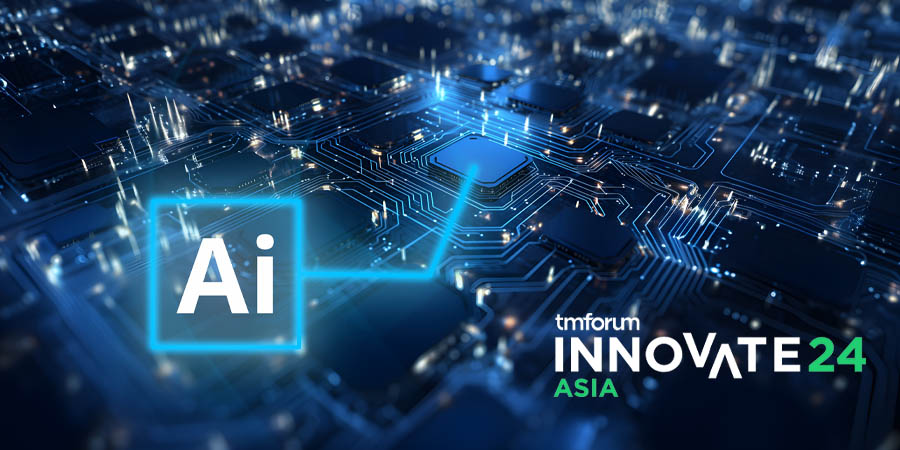Ahead of TM Forum’s Innovate Asia AI and Automation Summit in Bangkok, Nov 5th – 7th, TM Forum has released data looking at generative AI (GenAI) maturity levels for Telcos across the Asia Pacific region. The findings show that while Communications Service Providers (CSPs) in region are embracing GenAI, a maturity gap exists which could hinder their ability to move beyond bolt-on solutions to truly integrating AI as a native element across all operations.
The findings form part of the foundational data set for TM Forum’s GAMIT GenAI Maturity Index Tracker, developed in collaboration with AWS. GAMIT enables CSPs to benchmark their GenAI maturity against regional peers and global leaders, identify priority use cases and rapidly move from development through to production at scale.
72 AI-decision makers across 45 unique CSPs in 18 Asian countries contributed to the 200+ responses on which the GAMIT maturity model is built. Analysing this data can provide detailed insights into the challenges and opportunities faced by CSPs in region.
Bridging the maturity gap
It’s clear that AI – and GenAI in particular – provides a unique opportunity for CSPs globally to re-ignite growth in both purpose and shareholder returns in a challenging market. Reports on its impact vary, but a recent report by McKinsey estimates that nearly $100 billion in incremental value, and up to $180 billion in productivity gains, can be realised by telcos that position themselves at the forefront of this transformation.
While the Asia-specific data from GAMIT shows clear commitment and focus from CSPs around technology investment, skills, training and deployments, it also highlights a maturity gap between the current state and the sectors’ progress towards GenAI being deployed end-to-end across an entire organisation. The key areas of focus are:
- Lack of use case deployments: While 87% of CSPs have initiated GenAI deployments, only 11% have scaled beyond ten. This indicates that a large segment of the market is struggling to use GenAI at scale, with pockets of deployments rather than AI being embedded in core business functions and processes.
- The skills gap: The lack of necessary skills could be a major bottleneck. While 69% of operators in the region believe they have the capability to select the right LLM for the right use case, only one in seven operators feel confident in their ability to leverage advanced GenAI techniques such as RAG, prompt engineering, and fine-tuning. This skills deficit is further highlighted by the fact that while 35% have upskilled multiple teams and 19% are in the process of recruiting skills, a sizeable 46% report to currently not having the skills needed.
- Fragmented Leadership: A strong AI focus, often spearheaded by a dedicated CXO, is crucial for driving successful GenAI adoption. Encouragingly, 61% of Asian CSPs report having an AI center of excellence. However, only 46% have a CXO primarily focused on AI strategy and execution and only half have dedicated AI roles and responsibilities outside of the central AI teams. This lack of centralised leadership risks creating siloed initiatives and slowing down progress.
- Data quality and data access: GenAI's effectiveness hinges on access to high-quality data. Currently, just 17% of Asian CSPs report to have an excellent understanding of all the data that sits across the organization with 44% saying their understanding is poor or moderate. Additionally, 42% reporting to having access to moderate or poor quality data with just 9% saying excellent. This signifies a critical need for robust data governance frameworks and data quality improvement initiatives.
- Lack of measurement: Without clear metrics, it becomes challenging to track progress and demonstrate the value of GenAI investments. Currently, 55% of CSPs lack KPIs specifically related to the adoption of GenAI-enabled use cases in different parts of the organization. This makes it difficult to assess ROI and secure buy-in from stakeholders.
From the findings above it’s clear that there is commitment and momentum behind developing and implementing GenAI solutions at scale, but challenges exist across multiple domains.
Embracing the Six Pillars of GenAI Maturity
To help CSPs address these challenges the GAMIT tool provides an assessment based on six key pillars of AI maturity. This enables CSPs to swiftly benchmark their AI maturity, prioritize impactful use cases, and understand how to efficiently deploy high value GenAI solutions. Those pillars are:
- Technology Understanding and Maturity: Mastering the selection and adaptation of foundation models to address specific industry needs is crucial for swift ROI.
- Organization, Responsibilities, and Skills: Embedding the necessary skills and roles across the organisation, potentially through the establishment of a central AI function led by a dedicated CXO, ensures consistent and rapid AI deployment.
- Data Readiness and Availability: Ensuring fast and easy access to high-quality data from the telecom domain across the CSP's entire organisation is fundamental for both monetising data assets and enabling effective model fine-tuning.
- Governance, Privacy, Compliance, and Security: Integrating robust guardrails and policies from the outset enables privacy and security while maintaining the velocity of AI deployments.
- Business Objectives: Clearly defining and aligning GenAI initiatives with high-value business workflows is essential for achieving a step-change in value.
- Taking AI Use Cases into Production: Accelerating the journey from proof of concept to live deployments using cloud-native composable building blocks is key to scaling GenAI impact.
By benchmarking their maturity and progress against these six pillars, CSPs across Asia and globally can move beyond fragmented initiatives and establish GenAI as a core competency that can be deployed at scale. This will empower them to deliver exceptional customer experiences, achieve operational excellence, unlock new revenue streams and become more agile and future ready.
CSPs can take a proactive step in their AI transformation journey by accessing the Generative AI Maturity Interactive Tool (GAMIT) today. Available at https://inform.tmforum.org/research-and-analysis/interactive-tools, they will be provided with a tailored roadmap for implementation, and guidance on how to accelerate their journey towards becoming an AI-powered CSP.





